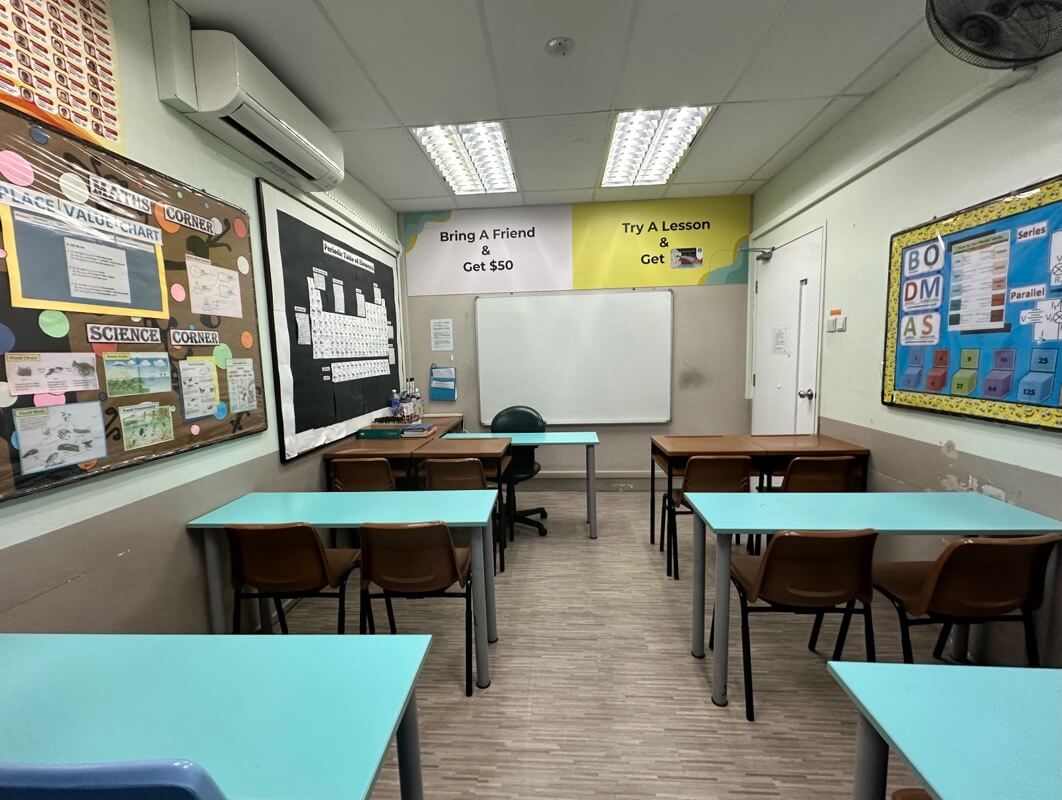1. Classrooms and Facilities:
5-6 classrooms or teaching spaces equipped with desks, chairs, whiteboards and teaching aids (such as charts, models, or manipulatives).
2. Office Space:
Administrative offices for staff, equipped with desks, chairs, computers, printers, and office supplies.
3. Library or Resource Room:
A collection of textbooks, reference materials, workbooks, and educational resources for students and teachers to use.
4. Reception Area:
A reception desk or area where visitors, parents, and students can check in, make inquiries, and receive information.
5. Technology Infrastructure:
Internet connectivity, computers or tablets for administrative purposes, and possibly for student use (in computer labs or for online learning).
6. Safety and Security Features:
Adequate lighting, and Certified emergency exits, fire safety equipment, and security systems to ensure the safety of students and staff.
7. Furniture and Fixtures:
Additional furniture such as cabinets, shelves, and storage units for organizing teaching materials and administrative documents.
Facilities
Other Tuition Centers:
Currently there are no other nearby tuition centers in the vicinity offering similar primary and secondary school subjects, as well as preschool programs. But we can't be sure that in the future there will be none.
School-Based Tutoring Programs:
Some schools offer their own supplementary tutoring programs or workshops after school hours, which can be seen as competition, especially if they target the same subjects and age groups.
Online Tutoring Platforms:
With the rise of online education, platforms offering virtual tutoring sessions in subjects like English, math, and science can provide convenient alternatives to traditional tuition centers.
Private Tutors:
Individual private tutors who operate independently and offer personalized tutoring services may attract students seeking one-on-one attention or specialized instruction.
Learning Apps and Software:
Educational apps and software designed for self-paced learning can appeal to students and parents looking for flexible and cost-effective educational resources.
Competition
Increase Enrollment Capacity:
Expand physical space by adding more classrooms or utilizing existing space more efficiently.
Hire additional teachers and staff to accommodate more students.
Offer flexible scheduling options to attract more students who may have varying time constraints.
Diversify Programs and Subjects:
Introduce new subjects or specialized programs based on demand or curriculum changes (e.g., STEM subjects, coding, specialized exam preparation).
Offer enrichment programs or extracurricular activities to complement core academic subjects.
Expand Age Groups and Educational Levels:
Extend services to cater to a broader range of age groups, such as offering programs for early childhood education, adult education, or vocational training.
Provide tutoring services for higher education levels (e.g., college entrance exam preparation).
Utilize Technology and Online Learning:
Develop or enhance online tutoring services to reach students beyond the local area.
Offer blended learning options that combine in-person instruction with online resources and tools.
Establish Multiple Locations or Franchise Opportunities:
Open additional branches in different neighborhoods or cities to reach a larger customer base.
Consider franchising the tuition center model to replicate success in new markets with local partners.
Partnerships and Collaborations:
Collaborate with schools, community centers, or businesses to offer joint educational programs or workshops.
Partner with educational technology companies to incorporate innovative learning tools into your curriculum.
Enhance Marketing and Branding:
Invest in marketing strategies to raise awareness about the tuition center's offerings and unique selling points.
Develop a strong brand identity and online presence through social media, website optimization, and targeted advertising.
Improve Facilities and Infrastructure:
Upgrade existing facilities and technology infrastructure to enhance the learning experience and attract more students.
Create a welcoming and modern environment that reflects the tuition center's commitment to quality education.
Offer Consultation and Specialized Services:
Provide consultancy services for educational institutions or corporations seeking specialized training programs.
Offer personalized tutoring services tailored to specific learning needs or learning disabilities.
Expand International or Multicultural Education:
Introduce language programs or cultural exchange initiatives to attract students from diverse backgrounds or prepare students for global opportunities.
Expansion Potential
The owner can assist in the running of the business for the first year, subject to negotiation
The use of the material for the tuition center can be purchase from the current owner.
Support and Training

